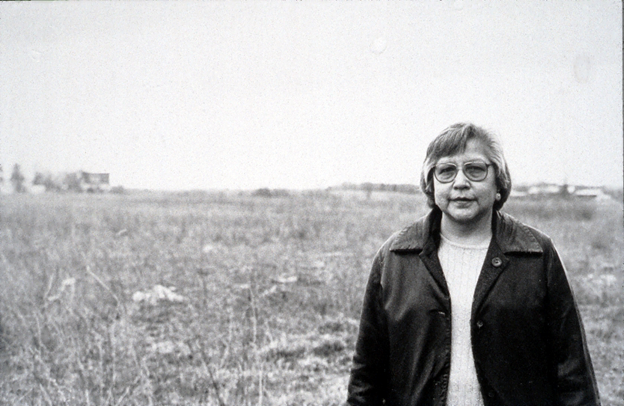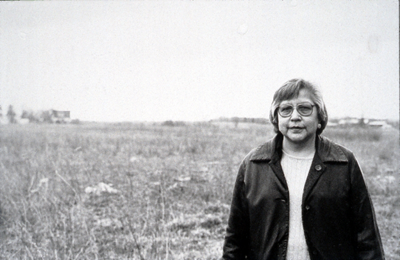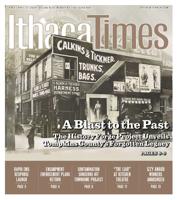It took a summer cross-country road trip from thousands of miles away for the Cayuga Nation to learn that their cherished SHARE Farm had been foreclosed on over a year ago.
Ken Wolkin, a master’s candidate at the University of Washington’s Department of Geography, who once called Seneca County his home, has closely studied the Cayuga Nation leadership dispute.
He trekked from Seattle, Washington, venturing homebound to Seneca Falls, New York, earlier this summer while the coronavirus surged — just to meet with the Grand Council.
While conducting interviews for his ongoing thesis, he revealed to Samuel George, the condoled chief of the Bear Clan, that their beloved 70-acre farm had been foreclosed upon on April 25, 2019.
Unbeknownst to the Nation, the property changed hands in a foreclosure conducted by Cayuga County — selling the land back to itself for $1.
They’ve been living and working that property, which once belonged to the traditional condoled chiefs and clan mothers in title for 14-years after purchasing the land for $200,000 in 2005.
Now, they have less than two-months to raise $116,000 to pay-off 14-years worth of back taxes in order to potentially save their farm — their first foothold within the Cayuga homeland.
Jack Rossen, a retired anthropology professor at Ithaca College, had always cared about the Cayuga Nation. Although he isn’t Native, he has served as a steward and strong ally to the Cayuga Nation for many years before moving to Florida.
It all started when he met Bernadette “Birdie” Hill, the Heron clan mother of the Cayuga Grand Council.
Rossen and some of his other non-Indigenous friends from Seneca Falls would listen her speak for hours and tell stories about “how they’d lost their land and longed to go back to their homeland.”
She shared stories about how her people were thriving before General Sullivan had been ordered to burn down their homes and hundreds of acres full of orchards and crops, at the direction of General George Washington during the brutal 1779 Sullivan-Clinton Expedition amid the American Revolutionary War.
Goyogouen, also known as Cayuga Castle, their largest settlement, had been located next door; and the Great Gully also served as a sacred place of refuge for the Haudenosaunee peoples.
Like the land and its soil, its history is rich, filled with stories to be told. And “Birdie” had been the anointed messenger.
Prior to 2001, some Cayugas live and still reside upon the Cattaraugus and Allegany territories within the Seneca Nation’s reservation near Buffalo, which is where “they were partially welcomed” but “not totally welcomed because it wasn’t their homeland,” Rossen remembered learning from Hill.
And that’s when the seeds for the Cayuga SHARE Farm had been deeply sown within the town of Springport.
“About the same time we heard about some folks who were selling a farm and organic farm, right in the homeland,” Rossen told FingerLakes1.com. “We cooked up this plan that we would buy the farm and I was the only single one who didn’t have debt.”
It was settled, he took paper ownership of the farm: deed and title, only after securing a mortgage in 2001.
“I can tell you it cost me over $100,000 out of my pocket, that project and years and years of work, energy and effort,” Rossen admitted.
He held onto the 70-acre property at 4061 Truesdale Rd., for another four years until he entrusted the land with the Cayugas.
“That’s why we did it because they had no land. They were the only federally recognized Haudenosaunee Nation without any land,” Rossen remembered.
Later named the Cayuga SHARE Farm, it became an educational center within the boundaries of the Cayuga County and much more.
The acronym SHARE, stood for Strengthening Haudenosaunee American Relations through Education.
In spite of initially not raising enough funds, the Onondaga Nation and Center of the Haudenosaunee “came up with the rest of the money” to pay-off the land transfer by the end of 2005.
At that time decades ago, “there were no factions,” and the Cayugas “were all together,” but that reality swiftly changed.
Clint Halftown, the Bureau of Indian Affairs’ federal representative of the Cayuga Nation, once started-out as “an acolyte” of Hill, but later created “a war on the traditionalists ever since,” according to Rossen.
“He was on his way to becoming a traditional chief, and then he got the bug for money and casinos,” he said. “He engineered that whole factionalism out of his personal design desire for a casino.”
Years before the split, however, Halftown had been heavily involved at the farm. He even brought a tractor to the site, which had been taken back following the fractionalization.
“One of the first things they did after the fractionalization was they came and they stole the tractor off the farm in the middle of the night,” Rossen revealed.
With the tensions mounting, the founders of SHARE eventually decided to gift the property to one of the factions — since both sides couldn’t simply share the farm.
In the infancy of SHARE — the farm was for everyone, all people, one Cayuga — until everyone started picking sides.
They too, had a choice as a roaring internal leadership dispute started unfolding before them — and the Cayuga SHARE Farm rested at the center of the conflict.
There weren’t any factions three years ago when Rossen and the rest of SHARE purchased the farm for the Cayuga Nation.
It was something that Rossen couldn’t even account for, insisting that he “didn’t see it coming” — no one could for that matter, except for Halftown.
“Actually people who are part of the non-traditionalists like Tim Twoguns, spent a lot of time at the farm working there, and I considered him a friend of mine, a good friend,” Rossen said. “So, it was really kind of bittersweet when we turned the farm over to the traditionalists because I didn’t know that was going to happen. I didn’t see it coming.”
That’s when Rossen and company turned over the Cayuga SHARE Farm to the traditional leadership toward the end of 2005.
It was still a tough decision for the SHARE Farm allies — a choice had to be made following the Nation’s fractionalization in 2004.
The non-traditionalist faction led by Halftown already owned Lakeside Entertainment, a Class II gaming bingo parlor, and the cigarette smoke shops that are scattered across Seneca and Cayuga counties.
Gifting the SHARE Farm to the traditional Cayugas, specifically the Heron clan and “Birdie,” who was their inspiration to found the farm, later ended-up being the right course of action.
When the property closure occurred inside a cramped lawyer’s office in downtown Ithaca, a representative from the non-traditional faction actually arrived there and witnessed the deed transfer unfold alongside another 20 onlookers from both sides of the dispute back in 2005.
“We turned it over to the so-called traditionalists, who did not have as many resources and that’s who Birdie was with,” Rossen explained.
Ironically, Halftown, the leader of the non-traditional opposition, is actually a member of the Heron clan, just like Hill.
Fifteen years later, Halftown ended up destroying his own lands in an act that Rossen called “absolutely barbaric” to see “Cayuga on Cayuga violence” in the neighboring town of Seneca Falls last February in 2020.
Fourteen years later, Jim Orman, the Cayuga County treasurer, had been listed as the owner and seller of the Cayuga SHARE Farm property during the 2019 foreclosure.
Jenny Indelicato, the county’s deputy treasurer, explained that they’ve been withdrawing Nation-owned properties from the foreclosure process every year.
“Typically, we get a stipulation of withdrawal from the Cayuga Nation for the properties,” Indelicato told FingerLakes1.com.
The stipulation of withdrawal process, which essentially exempts and appeals Nation-owned properties from undergoing the routine foreclosure proceedings.
And the reason why the county foreclosed upon 4061 Truesdale Rd. in the town of Springport became even clearer.
Simply put, Cayuga County patiently waited until the federal government made a determination about which faction was recognized as the ruling authority of the Cayuga Nation.
When the Halftown-led faction had been named by the Bureau of Indian Affairs, the county decided to foreclose upon the traditionalist-owned farm after that verdict in 2019.
“At that point, the faction that owned the property that we foreclosed on, was not part of the Clint Halftown faction. And so when they did the stipulation of withdrawal with us, that property was not included,” Indelicato later elaborated.
Shortly after the foreclosure occurred, however, another court case ruled that the federal government doesn’t have the actual authority to determine the Cayuga Nation’s leadership since it’s considered to be an internal matter, which had to be resolved by the Nation itself.
“When we saw that ruling, we said, okay, we can’t do anything with this property. We’re not going to go to auction. So that’s why we’ve been holding it,” she disclosed.
Since 2005, Indelicato revealed only a few properties that were owned by the Cayuga Nation Enterprises, an enterprise portfolio of businesses and properties managed by Halftown, had gone into foreclosure and later repurchased prior to auction.
As for the legality behind foreclosing upon Nation-owned lands, it’s admittedly “a little bit tricky” whenever Cayuga County steps in and tries to intervene amid a long-standing leadership dispute with two roaring factions, according to Indelicato.
“It’s not like there’s a guide out there that says this is really owned by the Cayuga Nation. That’s why we try to go to the Nation, at least the parts that are communicating with us and say what properties are yours, we will withdraw them,” she elaborated.
If the county successfully closes the property upon April 16, Orman believes that “it would be a huge precedent, and probably opens the door for who knows what.”
There are caveats, however. Appeals and other legal proceedings can bog down that process with Orman calling it “a sticky wicket.”
And the traditionalists never filed for any appeals during the time of the foreclosure in 2019, according to Joe Heath, the traditional Cayuga Nation’s legal counsel.
Although the farm had been foreclosed upon and currently rests in the possession of the county for almost two years, the treasurer’s office doesn’t plan on foreclosing upon any further Nation-owned properties: Halftown or otherwise.
Admittedly, their office tends to be “conservative” when it comes to following established precedents.
“I don’t know that we would move on Nation properties, and that’s exactly why we’re holding the other property and why we haven’t brought that to auction,” Indelicato said.
They’re cautiously moving forward until a new court decision grants them the authority to foreclose equitably on traditional and non-traditional owned properties throughout Cayuga County.
And the county treasurers claim that they simply can’t gift the property back to the Nation’s Grand Council either.
“As far as our office is concerned, we would go by the statute, and I don’t want to pass the buck, but we don’t have the authority to do what you’re suggesting. The Legislature would have that authority,” Orman insisted.
However, the legality behind the actual remains largely in-question by Heath, who insists that it’s illegal after citing a recent legal precedent from the U.S. Second Circuit Court of Appeals ruling from Manhattan that knocked down Seneca County’s argument to foreclose upon Cayuga Nation properties.
In that decision from Oct. 2020, the court ruled alongside the district court, stating that tribal sovereign immunity from suit bars Seneca County from pursuing tax enforcement actions under Article 11 of the New York Real Property Tax Law.
For those who don’t believe that a reservation never existed, he contends that its still there — 64,000-acres and all, sitting on top of Cayuga Lake like an “inverted U.”
And anyone who claims otherwise actively denying of the past, an endemic case of “ahistorical racism.”
“That’s what that is, any bunch of white people that says no sovereign nation, no reservation is denying historical reality and constitutional protections,” Heath argued.
As for Chris Palermo, the county’s attorney, who oversees the foreclosure proceedings, he clarified that the Nation’s property hadn’t solely been subject to the 2019 foreclosure. Rather, dozens of properties countywide were included.
Unlike other proceedings “municipal tax foreclosure notice provisions are substantially different,” according to Palermo.
“The onus is on the property owner to ensure that the municipality, the county has the proper mailing address,” Palermo told FingerLakes1.com.
The state’s Office of Real Property Services requires property owners to fill-out a RP 5217 form, a document that files mailing addresses, which are used for tax billing and sending off foreclosure notices.
The county sends two notices: one that’s First Class and another with a certified return receipt.
“Should they abandon that address and never update the county, state law doesn’t really put the obligation on us to chase that person down for that entity,” Palermo explained.
As long as the First Class mail doesn’t bounce back, “that still counts” as being received for all intents and purposes.
Palermo is “very reluctant” to directly notify the Nation and start “establishing precedent for any particular type of property owner in the county” at “the exclusion of others.”
“They presumably sent them to the post office box in Akron, New York, that’s listed on the deed. That’s what they should do,” Heath told FingerLakes1.com.
However, that particular post office box in Akron is the problem. This mailing location is where the Nation’s office formerly resided, which had been “abandoned” back in 2005, according to Heath.
“They did not, and it’s no longer used. And so if those notices were sent, we didn’t get them,” he added.
Heath didn’t even find out about the foreclosure until last September shortly after Wolkin alerted the Nation’s traditional leaders.

In 2010, an annual peach tree planting happened during the Cayuga Nation Picnic. It’s a symbolic act of healing and reconciliation from the 1779 destruction of the nearby 1,500 peach tree orchard at Chonodote Village during the Sullivan Campaign.
He then faced the ultimate question to reconcile: “How do I save this farm?”
“The only way is to raise enough money for the county to return the title to us, and that’s what will happen. If we can raise the money, they will give us a deed back,” he elaborated.
However, that aforementioned arrangement wasn’t so simple and set in stone. In Palermo’s eyes, the stipulated foreclosure proceedings are applicable to all property owners, not just for the Cayuga Nation.
“I absolutely would not characterize this as an agreement between myself and Joe or the county and the traditional faction of the Cayuga. This is county policy that applies to everybody,” he shared. “This conversation is no different than the conversations that we have with anybody else in the county, Native American or otherwise. There’s a common belief that people should be served, and the government is obligated to tell us when we have our taxes due and when you’re good, that’s not the case.”
Palermo also expressed that the county “always gives priority to the prior owner” essentially until the final day before the auction begins.
In this particular case, the farm isn’t listed for auction yet, but the county is still insisting for the Cayuga Nation to pay-off the property ahead of the April 16 county back tax payment deadline.
Even though the county is pushing for the Cayuga Nation to finally pay back property taxes almost two years after it had been officially foreclosed, county officials aren’t compelled to unload the 70-acre farm land whatsoever.
“There’s no requirement or obligation for the county to put it up for auction. We could keep it. The state allows for economic development corporations, you can transfer to them. There’s land banks, there’s all sorts of mechanisms that governments use to deal with tax foreclosed properties. And there’s an awful lot of options that are available in the future,” Palermo revealed.
All of the taxes, interest, penalties and fees, plus a $400 foreclosure fee are needed to cover the Nation’s costs to regain possession of the Cayuga SHARE Farm.
Since the Cayuga Nation has protested paying taxes in accordance with their beliefs, a PILOT, also known as a payment in lieu of taxes agreement, had been reached ahead of April 16, 2021.
Even if the payments are properly accounted for and accrued, the title purchase of sale to the previous owners still requires legislative approval at the county level.
The $116,000 in county back taxes would be held by Orman in the county’s trust account. The treasurer sits on the funds until the Cayuga County Legislature reviews the Nation’s application to reacquire their former title.
“The transaction doesn’t happen until after the Legislature approves the change of hands of the money. As long as the money is there, and it hasn’t been auctioned off, it would get approved.” Palermo explained. “And if it didn’t, let’s say it didn’t for some crazy reason, the money then is refunded.”
And that crazy reason could possibly become a reality for the Cayuga Nation later this April.
With the fate of the SHARE Farm resting solely in the hands of the Cayuga County Legislature, concerns have been aired among the Grand Council and the Nation’s leadership regarding whether the legislators will approve the property sale without prejudice.
Upstate Citizens for Equality is a prominent organization within Cayuga County, one that Rossen vividly recalls encountering almost two-decades ago while founding the Nation’s farm.
“They’re one of these anti-Indian hate groups that operated right there, and they actually formed in response to the SHARE Farm,” he claimed. “They put the signs up, and we had signs on both boundaries of the farm the entire time.”
Rossen, like others, believe that local politicians even within the county Legislature have “stoked” ill-intentioned and unneighborly-like sentiments against the Cayuga Nation — specifically its traditional tribal leadership.
The presence of the UCE could possibly sway the outcome of the Nation’s application being conceivably approved by the Cayuga County Legislature.
Meanwhile, the influence of Halftown still looms in the distance, with his numerous economic development dealings taking hold within the county — most recently, renewed talks with the Village of Union Springs officials to possibly open a new tribal casino.
“There are local politicians who have stoked that, in fact, by blaming the Native people for the long-term depression of the economy in the area, and using them as a scapegoat so that they don’t have to take responsibilities for their political actions that have or have not helped the county citizens,” Rossen said.
Keith Batman, the Cayuga County Legislature majority leader, a Democrat, who also represents District 7 which encompasses the town of Springport, revealed that he “will support a settlement of this tax debt” and continue being good neighbors with the Cayuga traditionalists, especially if they could recoup the funds to repurchase the farm.
“This is how we handle any and all such cases and support consistent treatment here,” Batman told FingerLakes1.com.
Although traditional Nation leadership are concerned about the process after FingerLakes1.com explained it to them, Batman believes the threat of retaliation by any of the 15 county legislators will “absolutely not” happen.
“There should be and will be no retaliation nor do I understand why this would even be of concern,” Batman wrote in an email. “Disagreement of opinion regarding issues of sovereignty should have no bearing on this decision.”
Despite Batman’s candid reassurances, Rossen insists that it’s “totally naive to think there won’t be a problem with the county” and its legislators.
Rossen and his wife, Brooke, both taught anthropology at Ithaca College.
An accomplished archeologist, he surveyed several historical sites throughout his career, and recently found out that his former department is being disbanded because of the pandemic’s financial impacts on the university and student enrollment.
Losing the farm, like the department, would be “heartbreaking” for him, and leaves the farm’s legacy hanging in the balance.
Through his privileged position as an academic professor for 20-years, he hoped of securing a better future for the Cayuga Nation by establishing the SHARE Farm on behalf of his inspiration: “Birdie.”
“It’s basically my life’s work, trying to help Native people, and it’s heartbreaking,” Rossen admitted.
He’s even written a 20-page unpublished memoir, which recounts the history of the property predating the actual farm since the 1970s.
“I could just tell you stories all day and all night about that place,” Rossen said. “The Cayugas really came to take spiritual ownership of that land, and they’ve been there since and now of course, it’s threatened with being lost to the county.”
From plantings to meetings where fellow Nations like members of the Yanomami tribe of Brazil ventured from the heart of the Amazon and visited their humble SHARE Farm, exchanging stories along the way.
The consequences of losing the SHARE Farm could be dire and lead to “the disintegration of the traditional faction of Cayugas” and “a blow to the traditional confederacy and clan mother system of government,” according to Rossen.
“I can’t even tell you the ramifications of losing that SHARE Farm. That is the place where all of the other traditional Nations recognize as the center of the Cayuga Nation. It’s the place where people come and connect with the land,” he mentioned.
And Rossen chronicled its rich history: all of the “highs and lows” across time, but now it could be lost forever.
Fortunately for the Nation, they’re almost near reaching their goal with less then two-months left before the debt is due.
Allies from across the Finger Lakes are converging virtually and online to financially back and save the Cayuga SHARE Farm. A GoFundMe page that was created by the Groundswell Center for Local Food & Farming nonprofit to save the farm has already raised $112,519 among 2,000 individual contributors.
Throughout the Haudenosaunee Confederacy, members from the several Nations have donated items that are set to be auctioned as a part of an online Facebook auction, which starts at 9 a.m. on Friday, Feb. 26 and concludes on Sunday, Feb. 28.
While everyone has been chipping in to save the Cayuga SHARE Farm following an outpouring of camaraderie, care and financial support, it’s still unclear whether Halftown even assisted in preserving the Nation’s homeland from falling into the hands of the Cayuga County — or in fact, even orchestrated it.
After multiple repeated media requests directed at Lee Alcott, partner of Barclay Damon, he didn’t answer whether Halftown would financially contribute in any capacity to protect sovereign Cayuga farm land from being taken away from the Nation by the county following the 2019 foreclosure.
This article was originally published on FingerLakes1.com.















(0) comments
Welcome to the discussion.
Log In
This is a space for civil feedback and conversation. A few guidelines: 1. be kind and courteous. 2. no hate speech or bullying. 3. no promotions or spam. If necessary, we will ban members who do not abide by these standards.